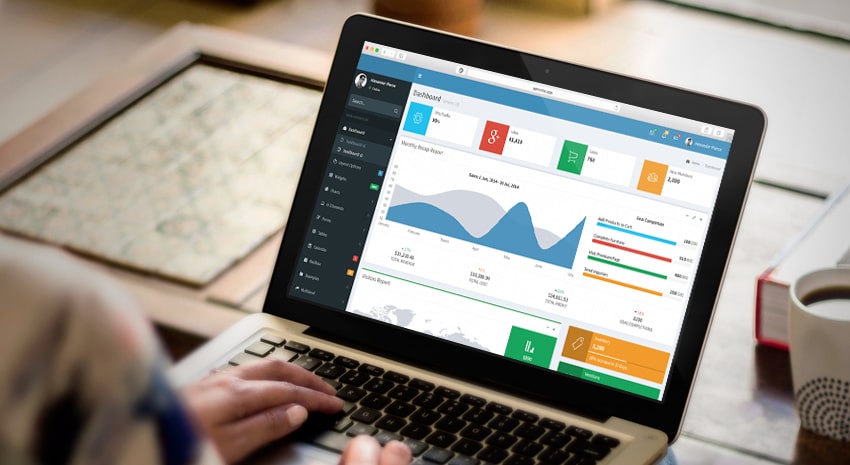Advantages and Disadvantages of Building Custom CRM Software for Your Business
Custom CRM software development aims to streamline business processes to enhance customer relationships.
Each business has its own set of requisites. An off-the-shelf customer relationship management (CRM) solution may not exactly meet your company’s needs. A customized CRM application, on the other hand, is tailored to fulfil your unique business needs.
What Is CRM Software?
 A CRM system enables businesses to plan, optimize, and synchronize all interactions with customers as well as analyze data throughout the customers’ lifecycle. The goal is to improve customer service, better understand customers, and enhance internal processes.
A CRM application categorizes customer data and provides support to managers. The easy access to the database which enables automation to marketing and customer relationship tools results in customer retention and sales growth.
A CRM system enables businesses to plan, optimize, and synchronize all interactions with customers as well as analyze data throughout the customers’ lifecycle. The goal is to improve customer service, better understand customers, and enhance internal processes.
A CRM application categorizes customer data and provides support to managers. The easy access to the database which enables automation to marketing and customer relationship tools results in customer retention and sales growth. Key Benefits of Custom CRM Software
Building a custom-fit digital tool to manage customer data and optimize marketing is needed when a ready-made CRM framework does not completely fit into the business processes.

The following are some unique advantages of a custom-built CRM program:
Tailored solutions to your need
Unlike pre-packaged CRMs that charge you for overrated features, customized CRM solutions are both flexible and tailored to the needs of your business. You are free to include whatever you need based on your previous customer's data, sales, and marketing experience. If you want to try a new design or change a few features, your team will handle it with ease.
CRM system framework
A CRM framework consists of various individual applications and processes that are structured to ease the works in specific departments. With customized CRMs, you can create elements of the framework in small sessions, scale them up, and modify them based on your needs.
Automated workflow
Your target audience's journey may include several stages. A custom CRM development could save you money by automating marketing, sales reports, analytics, customer support, delivery notification, and billing tasks with cloud integration. Specific types of automation are not always possible in packaged solutions.
Customer feedback analytics
If you want to give your company a boost but can't find out why you are losing your clients, you'll need a tool to investigate their perspectives. Although ready-made CRM programs can filter out general customer information, such as age, geography, and order quantity, customized CRMs can combine different features for a more precise result.
Centralized data aggregation
A custom-built CRM project gives you complete control over what is going on in the company on a digital level. Also, custom CRM development enables you to work with databases in the format commonly used by your team.
Disadvantages of Custom CRM Software

Here are some drawbacks of developing a customized CRM system:
Huge investments
The cost of designing and creating custom CRM applications is almost always higher than the cost of a subscription.
Scalability
Unlike off-the-shelf programs, a customized CRM system may be difficult to scale.
Long implementation
It can take months for developers to create tailored apps and programs, lengthening the time to market.
Difficult to maintain
When you subscribe to a CRM program, developers cover all maintenance responsibilities. However, if you build a CRM of your own, you are responsible for maintaining the software throughout its lifecycle, which means additional technical requirements and production costs.
We build custom software with modern solutions in mind for any business and sizes!
We build custom software with modern solutions in mind for any business and sizes!
Things to Consider Before Building Custom CRM Software

There are some important decisions to make before designing a CRM system, so you can make the best decisions possible right away and prevent costly mistakes before you build.
Set your goals
Begin by identifying and prioritizing your business goals for creating a CRM platform. This will assist you in deciding on the CRM system design and features that are most suitable for your company.
The type CRM system
Decide on the type of CRM solutions you need after you've defined your objectives. CRM is divided into three categories: organizational, analytical, and collaborative. Each is made for a specific purpose.
Access roles and levels
We recommend incorporating user functions and permissions because you'll possibly have several departments using your CRM for various purposes. C-level administrators, marketing managers, sales representatives, and consumer representatives are examples of user positions that can be included.
CRM Features
Determine which functionality you want to include in your CRM. Your decision should be driven by your objectives, which means you should concentrate on the features that will better suit your business requirements. Some of the most important features of any CRM are dashboards, reports, tasks, contact management, lead management, and mobile access.
SaaS platform or Internal software
Finally, think about whether you want to create a CRM framework solely for internal use or later turn it into a SaaS app. Software architecture changes can be excruciatingly painful and costly. If you choose the latter, make sure your architecture is versatile and scalable from the start.
We build custom software with modern solutions in mind for any business and sizes!
We build custom software with modern solutions in mind for any business and sizes!
How can Laneways Software & Digital help?
FAQs
Who needs custom CRM software?
Common users of a customized system are sales team managers, advertisers, salesforce, contact support agents, and brand analytics. They require more than a ready-made CRM as they collect data from different sources, including website analytics, call history, email services, and social media analytics.
What are some examples of CRM software?
Some examples of CRM systems include sales, inbound, operational, general, and fully-integrated CRM, which have their respective functionality.
How much does developing custom CRM software cost?
Since each CRM system has its core functions and features tailored to the company’s business needs, there is no set price for all CRM systems.
Conclusion
Jerome Rault
Partner with a software development team one that's passionate about creating success
With the broadness of the internet, and it’s continuous expansions across different platforms it is hard to leave a mark that lasts. With digital marketing services, easily make a mark of your own that pulls customers in from different parts of the internet.
